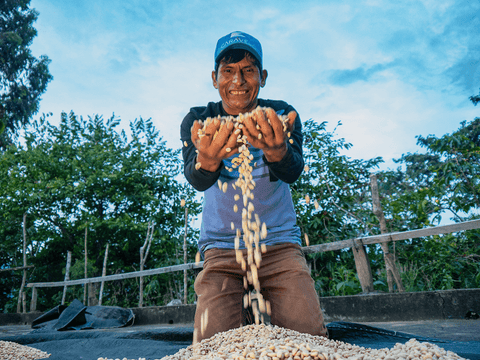Join us for a conversation with team Caravela, a proud partner of Standart Issue 29.
In your 2021 Impact Report, you highlight the number of young producers (under 30 years old) that you work with. Why is this a significant measurement? What are the implications for the overall impact related to the number of young producers in coffee?
The lack of generational change is one of the main challenges that face the coffee industry. Ageing coffee growers in Latin America, and younger generations looking for new opportunities in cities and far from the farm-life, are leaving a big concern about the future of coffee. Who is going to take over the farms? What is happening with all these farms when producers are too old to continue producing coffee, or when they pass away? To address this challenge, we must act today and not wait until it’s too late and when the coffee trees have been replaced by other crops, and there’s not enough coffee being produced.
The best way to guarantee a future in coffee is to demonstrate that coffee is sustainable today. If coffee is not profitable for a coffee grower today, coffee growers and their families will leave and look for new and better opportunities elsewhere. But rather, when a farmer sees and experiences the profitability of coffee today, their children will see that is worth staying and continuing the family legacy.
For this reason, we believe that the number of producers under 30 years old that we work with is extremely important. Assessing the gaps and challenges that younger generations have to sustainable development/prosperity, helps us to better visualize their needs and develop strategies through education to support these coffee communities in building resilience, which in turn will help to keep young producers investing in their farm business, improving their livelihoods in the long-term. It gives us hope for the coffee industry, it means that there are young people that still believe in coffee and its potential to be a sustainable option to make a living. Additionally, young producers usually bring fresh vision, and willingness to make things different and better, they have more access to information and bring new ideas that help the farm and the business improve.
'Who is going to take over the farms? What is happening with all these farms when producers are too old to continue producing coffee, or when they pass away?'
Our focus is to continue making coffee better and sustainable for coffee growers and encourage younger generations to involve in farm management. Some of the activities we do at Caravela, and with our PECA team on the ground is involving the younger generations of the farm in talks, workshops and farm activities that we carry out during our visits. We also have a trainee program for sons and daughters of coffee growers called “From Seed to Cup.” The young adults complete a coffee and cupping course in our purchasing stations, spending time with the PECA and Quality teams and learning about the whole process of coffee production and analysis. After graduating from this program, we usually hire them to become quality analysts in one of our purchasing stations or coffee labs.
Additionally, the PECA team has been visiting rural schools in coffee-producing regions to educate daughters and sons of coffee growers and start spiking the conversation and the passion for coffee in them. With this, we aim to bring knowledge and motivation to continue working and betting on coffee production.
Colombia represents the largest number of producers you work with. What other countries are you hoping to focus on in the near future?
For the first 10 years of Caravela, we only had operations in Colombia, focusing on developing long-term relationships and creating trust with thousands of coffee growers in the country. After 2010, we started our diversification strategy, opening export operations in other Latin American origins such as El Salvador, Nicaragua, Ecuador, and later Guatemala, Peru and, lastly Mexico. The main reason why Colombia continues to be the largest operation is because is the oldest operation.

In these other origins, we’ve been growing the number of producers we work with as we adapt, understand each culture, and create trust among producers and partners in each origin. We plan to continue expanding our network of coffee producers in all these origins, especially in Mexico, Peru, and Guatemala, where we see the highest potential to continue growing and where our business model of getting directly to coffee producers in their communities and supporting them in developing better farming practices, eventually increases their productivity and profitability.
What is the number one barrier for smallholder farmers when it comes to implementing greener practices?
The main barrier or challenge regarding greener and better environmental practices at farms is looking for productivity and profitability. For instance, in Mexico, we work with farms that apply little to no fertilizers during the year and have good agroforestry systems implemented, making their farms sequester more greenhouse gases than what the production process releases, hence having a regenerative effect. However, this implies having very low yields and production. Additionally, a coffee tree produces flowers when it gets stressed from sunlight, making coffee growing under direct sunlight much more productive. When coffee is produced under shade, it receives less light, doesn’t stress enough, and the yields are lower.

For this reason, it is key for coffee producers to have greener practices and lower carbon footprint to look for balance and gradually improve the low-hanging fruits. The solution is not to avoid fertilization, but rather to start replacing a percentage of some products and nutrients with greener alternatives or implementing a shade system that is not too invasive, but rather strategic and gradual. There are other greener strategies that coffee producers can look into that do not affect the yield and efficiencies that much, such as improving the water management system or the residual management systems.
'The main barrier or challenge regarding greener and better environmental practices at farms is looking for productivity and profitability.'
Coffee producers often face several barriers when it comes to engaging in sustainable, more environmentally friendly agricultural practices. One of the main barriers is the lack of access to information and resources. Many small-scale farmers, particularly in developing countries, do not have access to quality and long-term committed technical assistance services that could guide them into more sustainable or greener farm practices. Also, farmers may not have access to markets that reward these sustainable farming practices. This means that even if they invest in sustainable practices, they might feel or may not be able to recoup their costs due to the lack of premium prices for their coffee. Additionally, it’s important for governments, to strengthen their policies and regulations to promote sustainable agriculture, but also for organizations and the coffee industry to work together to provide the necessary resources and support to help overcome these barriers.
This interview was published in proud partnership with Caravela. Read more on their blog.



